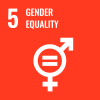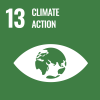Tana River, Kenya, 24 November 2023 – Leila Hulia and her family are witnessing unpredictable weather patterns and uncertain times that have ravaged their community in Tana River County in Kenya’s coastal region.
“It is raining now, and in two weeks, or even the day after tomorrow, drought will start, and our livestock will die.” Leila’s voice breaks when she thinks of what is to come.
Over 5 million people in Kenya went with limited access to water and food when the most severe and longest drought in recent times hit the country between 2021 and 2023. The heavy rains currently pounding the country are not bringing the much-needed relief that communities in Tana River had hoped for – instead, due to the parched land being less absorbent than normal soil, they are causing flash floods. After experiencing losses following the severe drought, pastoralists and farmers are now facing yet another catastrophic period, counting more losses as floods sweep away farmlands and kill their livestock, which have been the backbone of their livelihoods.

Floods in Tana River, Kenya have submerged homes and destroyed crops, displacing communities. Photo: IOM 2023/Moses Otunga
As a result of the community's dependency on pastoralism and subsistence farming, their livelihoods have increasingly been threatened as they grapple with long periods of drought and flooding each year.

Pastoralists are migrating to higher ground to protect their livestock from the ongoing floods in Tana River. Photo: IOM 2023/Moses Otunga
This layered impact of climatic shocks has left communities like Leila's not only reeling from their impacts and struggling to recover their lost livelihoods, but also created uncertainty as the weather patterns become more unpredictable with severe impacts.
“We were used to three months of rain followed by a few dry months,” explains Leila. “Now, we cannot plan anymore, we do not know when the next calamity will hit us.”

Taabu Kumbizi shares his experience: “I have been forced to move away from my hut, but where do I go now?” Taabu recounts how he lost poultry and belongings. “I can only wait by the road and beg people for help.” Photo: IOM 2023/Moses Otunga
“Our livestock cannot adapt to climate change, but we can,” states Leila.

Tawfiq Girls standing on a plot of land where they grow crops and use the profits to empower women in the community. IOM 2023/Wendy Gloria
As part of efforts to help their community adapt during these difficult and changing times, Leila and three of her friends came together and formed the Twafiq Girls Group, a Community Based Organization (CBO) in Minjila whose name loosely translates to the ability or opportunity to achieve success. Having witnessed firsthand the toll of adverse climatic shocks on the community's food security and livelihoods at large, despite their limited experience in crop farming, they launched a climate-smart agriculture initiative to grow and sell their products in the neighbourhood.

Over 200 community members are benefiting from the farm setup by Tawfiq Girls. The farm provides alternative livelihoods for communities in Minjila. Photo: IOM 2023/Wendy Gloria
They regularly consult agricultural experts for guidance on what would thrive with prevailing weather conditions and how to best care for the farm. Their need to offer solutions did not go unnoticed, as the community donated a large tract of farmland sitting just a few kilometres from Minjila town. The land is green with sorghum, a crop that is highly resistant to drought and acts as both a source of food and also as fodder for farm animal feed.
“When we started the farm, most community members thought that we were going mad,” says Leila. “Now they are slowly setting up farms and embracing our ideas.”

Leila and her friends are focusing on farming after losing their livestock to drought. Photo: IOM 2023/Moses Otunga
However, getting water to the farm during dry seasons and protecting the crops during intense rains remains a challenge.
“In Minjila, we go up to three months without water. We must walk almost five kilometres to Idsowe, where the River Tana passes, to get to the nearest water source, and the 20 of us can only bring back two jerrycans each of 20 litres to use both at home and on the farm,” says Leila.

Rivers and water sources such as water pans and shallow wells dry up across Tana River during drought, making it difficult for communities to access water. Photo: IOM 2023/Moses Otunga
Lack of access to water drives young women and girls in the community to walk longer distances than usual to seek water for farming and for their households, making them more vulnerable to sexual exploitation and gender-based violence.

Young women and girls are at risk of sexual exploitation and abuse as they walk longer distances than usual to fetch water. Photo: IOM 2023/Moses Otunga
The group has set up a water storage tank for the community to help mitigate such risks.
The water project generates roughly 7,500 Kenyan Shillings (USD 49), proceeds that they use to buy sanitary towels for donation to schools while also carrying out sensitization campaigns against female genital mutilation, which is rampant in Kenya’s coastal region.
A spike in demand has meant one tank is hardly enough to supply the entire community.

Leila hopes that more members of the community will embrace farming as an alternative source of livelihood in Minjila. Photo: IOM 2023/Moses Otunga
“We have the solutions to build resilience on the effects of climate change in our community, but we need resources and skills to implement them,” says Leila.
Through the project, the Twafiq Girls have identified the intersectionality between the impacts of drought, including the resulting lack of safe access to resources, and gender-based violence, sexual exploitation and negative cultural norms that impact women and girls. They are continuing to focus on identifying and driving solutions to address these multifaced issues.
This project funded by the IOM Development Fund is part of the "Think of Tomorrow, Act Today" campaign.
This story was written by Wendy Gloria, Migration, Environment and Climate Change Communications Assistant, IOM Regional Office for East and Horn of Africa.




